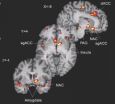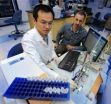(Press-News.org) ANN ARBOR, Mich. — Are you good at coping when life gets tough? Do people call you a straight-shooter? Will you help others without expecting anything in return?
Those personality traits might do more than help you win a popularity contest. According to new University of Michigan-led neuroscience research, those qualities also might make you more likely to get pain relief from a placebo – a fake medicine.
And, the researchers show, it's not just your mind telling you the sham drug is working or not. Your brain's own natural painkiller chemicals may actually respond to the pain differently depending on your personality.
If you're more of an angry, hostile type, they find, a placebo won't do much for you.
For the first time, the new findings link specific, established personality traits with an individual's susceptibility to the placebo effect from a sham medicine for pain. The researchers showed a significant link between certain personality traits and how much relief people said they felt when given the placebo – as well as the level of a specific chemical that their brains released.
The work, published online today in the journal Neuropsychopharmacology, was done by a team of U-M Medical School researchers and their colleagues at the University of North Carolina and University of Maryland.
The results build on nearly a decade's worth of work on the placebo effect by the team led by Jon-Kar Zubieta, M.D., Ph.D., the Phil Jenkins Professor of Depression in the U-M Department of Psychiatry, a professor in the Department of Radiology and a member of the Molecular and Behavioral Neuroscience Institute.
The findings show that about one-quarter of placebo response was explained by the personality traits of resiliency, straightforwardness, altruism or anger/hostility, as measured on standardized tests. Other personality traits didn't appear to be linked to placebo response. The new results come from a few dozen healthy volunteers, so the experiment must be repeated in larger, more diverse groups to be confirmed.
If confirmed, the findings could help researchers who study new drugs and other treatments – a field where placebo responses can really muddy the results and make it unclear whether the real therapy is working. Perhaps one day researchers will be able to adjust their results to account for the individual placebo responses of volunteers in their clinical trials.
Zubieta notes that the new findings came from a study involving pain, but that it may also apply to how personality influences a person's response to other stress-inducing circumstances.
"We started this study not just looking at measures that might seem more obviously related to placebo responses, such as maybe impulsivity, or reward-seeking, but explored potential associations broadly without a particular hypothesis," he explains. "We ended up finding that the greatest influence came from a series of factors related to individual resiliency, the capacity to withstand and overcome stressors and difficult situations. People with those factors had the greatest ability to take environmental information -- the placebo -- and convert it to a change in biology."
He and his team, including first author, former MBNI postdoctoral fellow and now psychiatry research investigator Marta Peciña, M.D., Ph.D., hope to continue the research in people with depression, and to continue to explore how genetics as well as personality influence placebo response.
He notes that the findings may even have implications for the doctor-patient relationship – for instance, patients who have certain personality traits and placebo-response tendencies may also be more likely to partner with their doctors on their care, and discuss frankly any concerns they have about their response to treatment.
How it was done:
The researchers conducted the study among nearly 50 healthy volunteers, both male and female, between the ages of 19 and 38. They gave each person a battery of standard psychological tests that help identify the strongest personality traits an individual has, and then had them lie down in a brain scanner called a positron emission tomography or PET machine.
They told the volunteers that they were going to experience pain from salt water injected into their jaw muscle, and that a painkiller – actually, a placebo – would be injected at certain times. They asked patients to rate how much relief they expected to get before the experiment began. Then, during the 20-minute period when volunteers received salt water and/or "painkiller", they asked them repeatedly to say how effective they though the painkiller was.
Meanwhile, the PET scanner made images of volunteers' brains, allowing the researchers to see how much of the natural painkillers called endogenous opioids, were released in certain areas of each person's brain under painful or "painkiller" conditions. They also drew blood from some of the patients during the experiment, and measured levels of a stress-induced chemical called cortisol.
After the tests, the researchers performed sophisticated statistical analysis to determine how personality traits influenced pain ratings, brain chemical response and cortisol levels. Although the cortisol levels did not seem to be influenced by personality traits and the placebo effect, the endogenous opioid activation elicited by the placebo, as well as patient-rated pain intensity levels, were.
INFORMATION:
In addition to Zubieta and Peciña, the team included Hamdan Azhar, M.S. and Tingting Lu, M.S., of MBNI and the U-M School of Public Health's Biostatistics program, MBNI research investigator Tiffany M. Love, Ph.D., Barbara L. Fredrickson, Ph.D. of UNC, and Christian S. Stohler, D.M.D. of U. Maryland. The research was supported by grants from the National Institutes of Health, including R01 AT 001415, R01 DA 016423 and R01 DA 022520, and by the Phil F. Jenkins Foundation.
Volunteers are needed for other studies by this team; visit www.umclinicalstudies.org and search for Zubieta.
When the going gets tough, the tough get... more relief from a placebo?
University of Michigan-led brain research may help explain why sham medicines work for some more than others, and could be used to improve tests of new treatments
2012-11-15
ELSE PRESS RELEASES FROM THIS DATE:
Oxytocin keeps flirting folks at arm's length
2012-11-15
Flirting brings women and men closer. But the "social distance" ensures that they will keep a certain spatial distance from each other. Researchers under the leadership of the University of Bonn studied whether this distance can be diminished by the so-called love hormone, oxytocin. The exact opposite turned out to be true – men who were in a committed relationship even maintained a greater distance from an attractive woman when under the influence of oxytocin than their control group. The study has just been published in the renowned "Journal of Neuroscience."
When people ...
'It’s not like CSI': The science of the search for Richard III
2012-11-15
Search for King Richard III press portal: http://www2.le.ac.uk/offices/press/media-centre/richard-iii
DNA testing, environmental sampling and radiocarbon dating are some of the tests being undertaken to determine whether the skeleton found in Leicester was once Richard III - and there are also plans to do a facial reconstruction.
Lead archaeologist Richard Buckley, of the University of Leicester's Archaeological Services, has explained the schedule for the scientific processes the skeleton is being subjected to.
The complexity and rigorousness of the tests – along ...
RSV study shows potential for vaccine strategies to protect babies
2012-11-15
Research by the University of Warwick indicates that vaccinating families could protect young babies against a common winter virus which can be fatal for infants under six months.
Respiratory syncytial virus (RSV) typically leads to mild, cold-like symptoms in adults and older children but can be more serious and even fatal in infants under the age of six months as it can lead to bronchiolitis and pneumonia.
The virus is commonly found all over the world. In the UK, outbreaks generally start in November or December and last four to five months, peaking over the Christmas ...
Meteorites reveal warm water existed on Mars
2012-11-15
Image of the Lafayette meteorite available from pressoffice@le.ac.uk
New research by the University of Leicester and The Open University into evidence of water on Mars, sufficiently warm enough to support life, has been published this week in the journal Earth and Planetary Science Letters.
The study determined that water temperatures on the Red Planet ranged from 50°C to 150°C. Microbes on Earth can live in similar waters, for example in the volcanic thermal springs at Yellowstone Park, the scientists behind the research point out.
The research is based on detailed ...
Cash cuts increase smoking death risk for world's poor, study says
2012-11-15
Proposed funding cuts within the international body responsible for tobacco control will leave the world's poorest countries more vulnerable to smoking-related diseases, a study suggests.
As many as 80 countries from the developing world, such as Paraguay, Rwanda, and Kyrgyzstan, could effectively be excluded from the forum tasked with reducing global tobacco use should the cuts go ahead.
The World Health Organisation's Framework Convention on Tobacco Control (FCTC) is considering cutting its funding for delegates from poorer countries to attend meetings.
Parties ...
Thermogenerator from the printer
2012-11-15
The computer activates an alarm: the machine's motor is threatening to overheat. The thermosensor attached directly to the motor housing reports the threat. The information is transmitted to the maintenance service which ensures that the cause is identified. Sensors can be used in factories, car manufacturers and other areas in everyday life. They measure temperature, humidity and wear and tear. Data is transmitted to the computer via wireless communication and read out. This enables the provision of information on the condition of parts – for instance, whether maintenance ...
GW Research chosen as 'paper of the week' for blood coagulation discovery
2012-11-15
WASHINGTON (Nov. 15, 2012) – Researchers at the George Washington University School of Medicine and Health Sciences (SMHS) will be featured as a top paper in next week's issue of the Journal of Biological Chemistry. Research by Rakesh Kumar, Ph.D., Catharine Birch McCormick Endowed Chair of the Department of Biochemistry and Molecular Biology and professor of biochemistry and molecular biology, and Beatriz Sánchez-Solana, postdoctoral fellow at the department of biochemistry and molecular medicine, both at SMHS, has been selected as the journal's "Paper of the Week". The ...
President's Bioethics Commission posts Study Guide
2012-11-15
Washington, D.C. – The Presidential Commission for the Study of Bioethical Issues today released an ethics study guide based on the Commission's investigation into the U.S. Public Health Service (PHS) experiments conducted in Guatemala in the 1940s. A Study Guide to "Ethically Impossible" STD Research in Guatemala from 1946 to 1948 is designed for use by higher education and other interested members of the public. It is free and available for immediate use in classrooms and elsewhere at www.bioethics.gov.
"As the world is now aware, the PHS research involved intentionally ...
ACA: More than a million women could gain access to potentially life saving tests for cancer
2012-11-15
WASHINGTON—A study by researchers at the George Washington University School of Public Health and Health Services (SPHHS) indicates that full implementation of the Affordable Care Act would expand health insurance coverage for more low-income women, enabling more than a million women to obtain potentially life-saving screening for breast and cervical cancer. The study, "Health Care Reform and Women's Insurance Coverage for Breast and Cervical Cancer Screening," was published in a recent issue of the journal Preventing Chronic Disease.
In the past, many low income women ...
Protein tug of war points toward better therapies for cardiovascular disease
2012-11-15
AUGUSTA, Ga. – Two proteins are in a tug of war that determines how much the body makes of superoxide, a highly reactive and potentially destructive product of oxygen that's dramatically elevated in cardiovascular disease, researchers report.
Their finding indicates an antiulcer drug just may help the body reduce excessive levels.
Hsp90 and Hsp70 are both heat shock proteins but appear to have opposite effects on reactive oxygen species production, said Dr. David J.R. Fulton, Interim Director of the Vascular Biology Center at the Medical College of Georgia at Georgia ...
LAST 30 PRESS RELEASES:
Personal perception of body movement changes when using robotic prosthetics
Study shows brain responses to wildlife images can forecast online engagement — and could help conservation messaging
Extreme heat and drought at flowering could put future wheat harvests at risk
Harlequin ichthyosis: a comprehensive review of pathogenesis, diagnosis, and management
Smithsonian planetary scientists discover recent tectonic activity on the Moon
Government censorship of Chinese chatbots
Incorporating a robotic leg into one’s body image
Brain imaging reveals how wildlife photos open donor wallets
Wiley to expand Advanced Portfolio
Invisible battery parts finally seen with pioneering technique
Tropical forests generate rainfall worth billions, study finds
A yeast enzyme helps human cells overcome mitochondrial defects
Bacteria frozen in ancient underground ice cave found to be resistant against 10 modern antibiotics
Rhododendron-derived drugs now made by bacteria
Admissions for child maltreatment decreased during first phase of COVID-19 pandemic, but ICU admissions increased later
Power in motion: transforming energy harvesting with gyroscopes
Ketamine high NOT related to treatment success for people with alcohol problems, study finds
1 in 6 Medicare beneficiaries depend on telehealth for key medical care
Maps can encourage home radon testing in the right settings
Exploring the link between hearing loss and cognitive decline
Machine learning tool can predict serious transplant complications months earlier
Prevalence of over-the-counter and prescription medication use in the US
US child mental health care need, unmet needs, and difficulty accessing services
Incidental rotator cuff abnormalities on magnetic resonance imaging
Sensing local fibers in pancreatic tumors, cancer cells ‘choose’ to either grow or tolerate treatment
Barriers to mental health care leave many children behind, new data cautions
Cancer and inflammation: immunologic interplay, translational advances, and clinical strategies
Bioactive polyphenolic compounds and in vitro anti-degenerative property-based pharmacological propensities of some promising germplasms of Amaranthus hypochondriacus L.
AI-powered companionship: PolyU interfaculty scholar harnesses music and empathetic speech in robots to combat loneliness
Antarctica sits above Earth’s strongest “gravity hole.” Now we know how it got that way
[Press-News.org] When the going gets tough, the tough get... more relief from a placebo?University of Michigan-led brain research may help explain why sham medicines work for some more than others, and could be used to improve tests of new treatments


